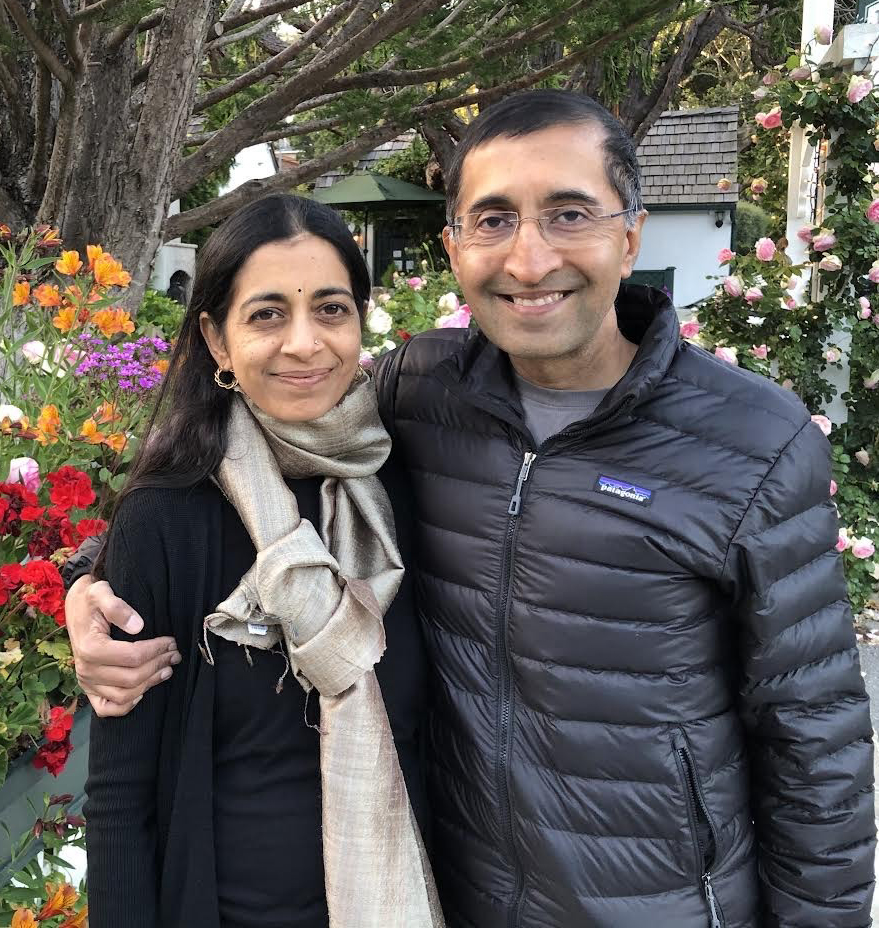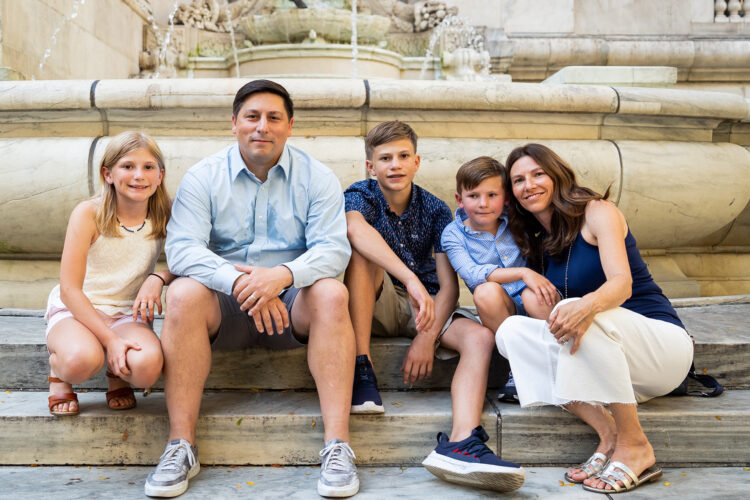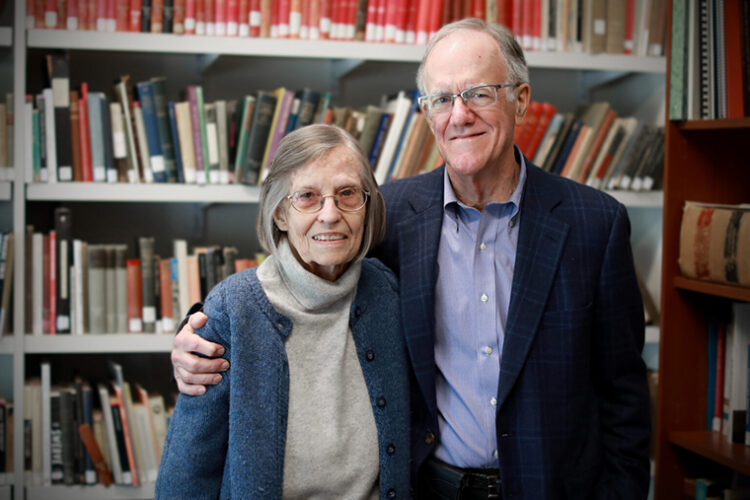Krishna Bharat and his wife, Kavita Thirumalai, first came to Washington University when their daughter, Meera Bharat, AB ’23, was touring prospective colleges. “We visited campus and met with faculty,” Krishna Bharat recalls. “Everything was so nice. We hoped Meera would choose WashU, and she did.”
Unlike her father, who studied computer science, or her mother, who trained in epidemiology, Meera was more passionate about design. She enrolled in the Sam Fox School of Design & Visual Arts to pursue an architecture major. A fellow design enthusiast, Bharat was supportive of her choice of study. “I kind of geeked out about it,” he says.
A distinguished research scientist at Google, Bharat is particularly interested in the impact of emerging technologies like artificial intelligence on the future of higher education. Together, he and his wife saw an opportunity to help WashU become a leader in the conversation around AI and design. “Why wait and see when you can instead have professors and students work together to innovate?” he asks.

In 2022, before AI programs like ChatGPT and Midjourney were making news headlines, the Bharats approached university leaders about supporting WashU’s efforts in this area. After conversations with Chancellor Andrew D. Martin, the deans of the McKelvey School of Engineering and the Sam Fox School, and others, the couple committed $1.5 million to endow the Kavita and Krishna Bharat Professorship in the Sam Fox School, with a secondary appointment in McKelvey Engineering. Their gift, which qualified for a $500,000 match through the McKelvey Engineering Challenge, establishes a new faculty position focused on the intersection of AI and design. The professorship aligns with the strategic plans for the Sam Fox School and the broader university, which both name digital transformation as a core initiative.
“After many fascinating and inspiring discussions with Krishna, I found myself deeply influenced by his vision, particularly regarding the significance of AI in shaping the future of architecture, art, and design,” says Carmon Colangelo, the Ralph J. Nagel Dean of the Sam Fox School and the E. Desmond Lee Professor for Collaboration in the Arts. “The Bharats’ generous gift has positioned us at the vanguard, sparking critical discourse and generating ideas that are propelling our digital transformation objectives forward in alignment with our longterm goals.”
Aaron Bobick, McKelvey Engineering dean and the James M. McKelvey Professor, also is grateful to the Bharats for their forward-thinking investment in WashU. “The Bharat Professorship strengthens our partnership with the Sam Fox School and will encourage students and faculty across disciplines to explore the role of technology and especially AI in the evolution of design.”
For his part, Bharat hopes the professor will act as a shepherd, bringing disciplines and new technologies together. He imagines students in the Sam Fox School working with their peers in McKelvey Engineering to devise AI-driven solutions to design problems. “Both sides will be tackling real issues and learning how to communicate with one another more effectively,” he says. “There’ll be a virtuous cycle between technology and design.”
A technology leader
Bharat’s interest in bridging technology and design was on display during his keynote speech at the AI + Design Mini-Symposium organized by the Sam Fox School and McKelvey Engineering. Held in spring 2023, the symposium lineup included alumnus Kory Bieg, AB ’99, an associate professor and associate dean at the University of Texas at Austin School of Architecture, and WashU’s Ian Bogost, the Barbara and David Thomas Professor, whose research centers around gaming and computing.
During his address, Bharat spoke about how engineers train AI and how the system learns. “The AI juggernaut has been building for the last 10 years, and it’s only the beginning,” he remarked.
Bharat has been working in computer science for most of his life. He grew up in Bangalore, India, which has become a technology capital. In the early 1980s, however, he was one of only a few kids he knew who had a computer at home. “I was exposed to computer science at an early age and was really excited about the field,” Bharat says.
He attended the Indian Institute of Technology Madras and then moved to the United States to complete his doctorate in computer science at the Georgia Institute of Technology. While there, he crossed paths with Aaron Bobick, who served as a professor and founding chair of Georgia Tech’s School of Interactive Computing before being named dean of McKelvey Engineering in 2015.
When Bharat graduated from Georgia Tech in 1996, he was intrigued by the internet, which was still relatively new. While a staff research scientist at Digital Equipment Corp.’s Systems Research Center, he was part of the team that developed the AltaVista search engine. During that time, he met his future wife, Kavita, who was working toward a master’s degree in public health with a concentration in epidemiology at the University of Alabama at Birmingham. Until 2017, she was a research associate at the Center for Policy, Outcomes, and Prevention at Stanford University. In 1999, Bharat joined Google to head up Google Research. He later founded Google News and established the company’s engineering operations in India.
Gratitude for a great education
The Bharats are excited to follow the professorship’s impact on students. They understand the power of the WashU experience because they saw their daughter thrive as an undergraduate. “WashU shaped her life,” Bharat says of Meera, who is now pursuing a master’s degree in human-computer interaction at Georgia Tech. “We value the education she received and the wonderful faculty who guided her, and we want to empower the university to do the same for other students.”
Although their backgrounds are in science, the Bharats, who reside in Palo Alto, California, both love the arts. Bharat paints portraits of his family, while his wife is a classical Indian dancer and curator of the IDIA Dance Festival.
Looking ahead, Bharat is optimistic about the ways in which AI might interact with art, architecture, and design. “Design is a very human-centric thing,” he says. “I think AI is only going to speed up the creative process and increase the designer’s creativity and the client’s satisfaction. This might be the best of times, if properly engineered.”


